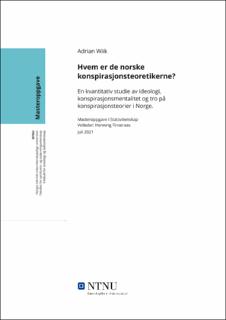Hvem er de norske konspirasjonsteoretikerne?
Abstract
Det eksisterer en utbredt antakelse innenfor og utenfor akademia om at konservative og høyrevridde velgere er mer predisponert for å tro på konspirasjonsteorier. I denne studien undersøker jeg korrelasjonene til konspirasjonsmentalitet og effekten av konspirasjonsmentalitet og politisk preferanse på troen på tre spesifikke konspirasjonsteorier i et representativt utvalg. Resultatene viser at en rekke sosiodemografiske variabler og variabler som måler evalueringer av det politiske systemet predikerer økt nivå av konspirasjonsmentalitet forstått som en generell tilbøyelighet til å tro på konspirasjonsteorier. Spesifikt korrelerer laver utdanning, lavt nivå av tillit, misnøye med det politiske systemet, en opplevelse av at politikk er innviklet, lav opplevd innflytelse på politikken og det å ha politisk preferanse i ytterpunktene av det ideologiske spekteret med økt score på konspirasjonsmentalitet. Konspirasjonsmentalitet målt som en 5-punkts skala blir validert som en signifikant og stabil prediktor på de spesifikke konspirasjonsteoriene. Til slutt bidrar jeg til debatten om hva som forårsaker tro på spesifikke konspirasjonsteorier ved å vise at tro på spesifikke konspirasjonsteorier er resultatet av både en generell konspirasjonsmentalitet og politisk motivert tenkning. There exists a clear assumption both outside and inside academia that conservatives and right wingers are more predisposed to belief in conspiracy theories. In this study I examine the correlations of conspiracy mentality among Norwegians and the role of conspiracy mentality and political self-placement on belief in three specific conspiracy theories. Results show that a range of sociodemographic variables and variables measuring political behavior predicts increased conspiracy mentality understood as a general propensity to believe in conspiracy theories. Specifically, lower levels of education, low levels of trust, confusion about politics, low perceived influence on politics, unhappiness with the way democracy works and belonging to the political extremes at both ends of the left-right spectrum correlates with higher scores on conspiracy mentality. This allows me to cautiously answer the question of who the Norwegian conspiracy theorists are. Conspiracy mentality measured as a 5-point scale is validated as a stable predictor of belief in the specific conspiracy items measured. Finally, I contribute to the debate on the causes of belief in specific conspiracy theories by showing that belief in the specific conspiracy theories is the result of both a general conspiracy mentality and partisan motivated reasoning.
